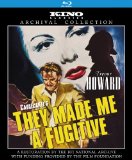| Reviews & Columns |
|
Reviews DVD TV on DVD Blu-ray 4K UHD International DVDs In Theaters Reviews by Studio Video Games Features Collector Series DVDs Easter Egg Database Interviews DVD Talk Radio Feature Articles Columns Anime Talk DVD Savant Horror DVDs The M.O.D. Squad Art House HD Talk Silent DVD
|
DVD Talk Forum |
|
|
| Resources |
|
DVD Price Search Customer Service #'s RCE Info Links |
|
Columns
|
|
|
Kino Classics Presents: They Made Me a Fugitive
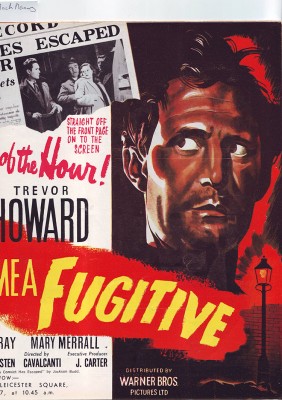
The apparently very prolific Brazilian/French/British filmmaker Cavalcanti is one about whom I clearly know far too little, if the ravishing introduction to his work that I've just had in the form of his 1947 English noir, They Made Me a Fugitive (released in the U.S. as I Became a Criminal), is any indication. Working in conjunction with The British Film Institute and The Film Foundation, Kino Classics has rescued and preserved Cavalcanti's vital, unbelievably under-celebrated film for us, presenting it in a meticulously restored new Blu-ray edition; this film actually makes one hope they'll find a way to bring out more from this relatively unsung cinematic hero. The ingredients the director is working with here are top-grade to begin with: Wizard of Oz screenwriter Noel Langley's script, taken from Jackson Budd's novel A Convict Has Escaped, is rife with snappily sardonic dialogue exchanges befitting the tale's overflowing sewer of malevolent fate, bad luck, and severe postwar doubt and disillusionment, all in the setting of a nighttime Manchester underworld of black markets, seedy show biz, drugs, and prostitution -- a hardened, cold, mercenary milieu that gives the lie to any professed sense of British triumphalism after having won the war -- practically a dictionary-definition noir setting. There are simply no compromises in this riveting, bracingly doomy story, which remains convinced, to its bitter end, that no good deed goes unpunished and the cruel world isn't going to cut one any slack just because one has innocence or is acting out of unselfish, undying love. But it's all of Cavalcanti's fresh, bold, inventive choices in the step-by-step of telling Langley's and Budd's story that will really get you excited about this wonderful film: He gives us its onscreen world, with its tough, self-protective, sometimes passively and sometimes aggressively evil denizens and their outwardly streetwise, secretly gold-hearted victims, in multilayered, incredibly stylish strokes that make the film seem worthy of mention in the same breath as Carol Reed's The Third Man, a classic, perfect noir in a similar vein that I'd go so far as to say They Made Me a Fugitive ranks only just below.
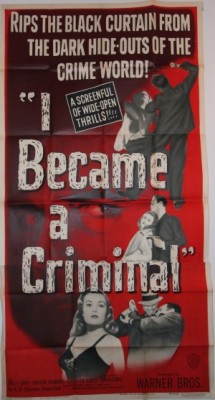
The great British screen star Trevor Howard (lead player in Brief Encounter before his turn here, and in The Third Man itself a couple of years later) is Clem, a former Royal Air Force pilot who acquitted himself with good-citizen duty and pride during the war and now has nothing but a usually drunken sense of aimless futility and a pocketful of black-market cigarettes to show for it. An underworld acquaintance of his, the clever-talking, sinister Narcy (Griffith Jones), who uses his Valhalla Road funeral parlor storefront as a cover for his band of smugglers in rationed/rare booze, cigs, and nylons (and, to the pragmatically flexible but ultimately moral Clem's Godfather-like disgust, heroin), has proposed an occupation for Clem: a little nobody-gets-hurt black-marketeering, which the burnt-out, devil-may-care Clem joins in with, against his better judgment, on the fateful toss of a coin. Perhaps out of jealousy (he's now cozy with Clem's former paramour, Cora (René Ray)), perhaps because he can't stand Clem's principles, Narcy has it in for his new employee, framing him up for the heist and the murder of a policeman and landing him in jail for a 15-year sentence. When Narcy's scorned woman, the chorus girl Sally (Sally Gray), visits Clem in jail, claiming to want to help him, he rejects her motives as ulterior or worse, claiming she's just out for revenge or keeping an eye on Clem to make sure he doesn't rat out Narcy. But the outwardly velvet-cool Sally is a tender soul, and she falls for this handsome man she knows has been wronged; Howard and Gray give Clem and Sally a bristlingly sexy, erotically adversarial Bogie-Bacall chemistry from their first moment together, and when Clem busts out of jail, becoming the titular fugitive in a quest to make it back to Manchester to give Narcy his comeuppance and get his name cleared, Sally is virtually the only person he can count on.
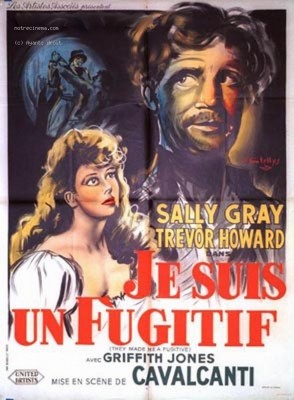
Clem's journey, both geographically and emotionally, is traced by Langley and Cavalcanti in precisely arranged and integrated stretches that the director, who (with the indispensable aid of master film editor Margery Saunders, who helped on the montage in David Lean's This Happy Breed and Great Expectations before taking her rightful place as principal cutter here) keeps everything running smoothly and artfully, but then he'll transition, unexpectedly but without a hitch, into sublime territory, easing the entire affair up off the ground and into glorious cinematic art, taking us onto very high peaks of visual storytelling: In an episode where Clem is offered clothes and a meal from an upper-crust, country-home-dwelling woman (Vida Hope, in a chilling performance that erases the distinction between plummy upper-class affectlessness and murderous psychosis) whose home he's broken into -- a lady who's perfectly willing to help him in exchange for his murdering of her boozy wreck of an aristocrat husband, which, upon Clem's refusal, she then carries out herself and hangs on him as an additional false accusation -- a close-up of a lace doily daintily lifted to reveal a handgun becomes a sly metaphor for appearances and realities in postwar Britain. When Narcy confronts Sally about her sympathy for Clem (in a scene whose harsh, shocking violence is one of several here that anticipate the bold, raw, high-stakes brutality of Dassin's Rififi a few years later), we cut back and forth from Sally's frightened, cowering visage to almost subliminal, staccato shots of the criminal's grotesque, warped reflection in the mirror, followed by some dazzling camerawork from Sally's point of view as her unjust punishment commences, orchestrated into harmony with Saunders's rapid-fire cutting and Marius-François Gaillard's tension-heightening score for a cumulative, viscerally terrifying, exhausting, gut-punch effect. A long sequence depicting a nighttime journey after Clem has hitched a ride with a suspicious lorry driver is a masterpiece of movement within and between shots, with Cavalcanti and Saunders gradually editing faster and faster to bring out and then sustain the rising fear in a fraught situation. And Cavalcanti reserves his biggest set pieces for the film's thrilling climax, a one-two punch of knuckle-biting eternity as we wait for Clem to arrive in a trap set by Narcy at the funeral parlor (which, through expert choices of shots and cuts, becomes as alive in this clock-ticking, waiting silence as the hall of mirrors in The Lady from Shanghai), followed by a rooftop confrontation between Narcy and Clem that is actually heightened into mythological/allegorical territory rather than diminished by the obvious but gorgeous artificiality of the surrounding "Manchester" vista we see from on high. From the beginning right down to the last forlorn shot in which the lone Sally, standing on a rain-slicked sidewalk, grows smaller and smaller in the distance from Clem's (and our) view as he's taken away, still unredeemed despite everything, this film has astoundingly controlled, inspiringly creative storytelling artistry flowing through its every frame.
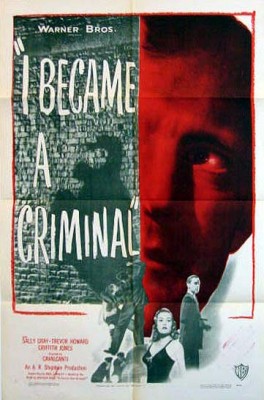
They Made Me a Fugitive contains the usual, unavoidable signs of its vintage (not that the dose of long-lost visual glamour doesn't make for its own kind of nostalgic treat), but filmmaking this engaged, passionate, and thrilling from the ground up is destined to remain timeless; in every important way, it feels like it could've been made yesterday, and I guarantee you that it will be as exciting to watch tomorrow as it was 60 years ago. It's applicable in every case and could be used in praise of a great number of good to great movies, but Cavalcanti's ardent, full-throttle work in bringing Langley's intense, black-coffee view of down-and-dirty postwar existence (or is that existentialism?) to fluid, vibrant life gives rise to the first film ever to make me flash on Susan Sontag's definition of "style" as that hard-to-define something a film or other experience possesses, the quality that must "exhibit a certain deviation from the most direct, useful, insensible mode of expression or being...." That means that in order to have a style, a storyteller has to have all the basics down so pat they don't have to think about them, and then go above and beyond in conceiving and intuiting the best way of shaping and forming whatever materials they're working with (in this case, Langley's screenplay, the shooting/postproduction apparatuses, and the actors who give such heavily invested, unique, nuanced performances). On those terms, and on the basis of They Made Me a Fugitive alone (but oh, how it's given me an intense desire to see more of his films!), I'd characterize Cavalcanti as one of the most stylish cinematic storytellers we've ever had.
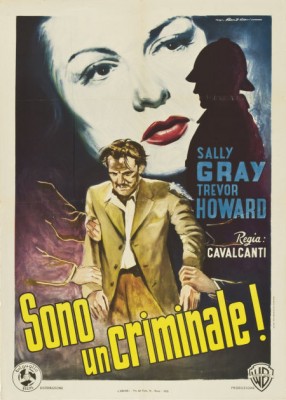
THE BLU-RAY DISC:
All things considered, Kino Classics' AVC/MPEG-4, 1080p transfer, which presents the film at the aspect ratio of 1.33:1 (though both IMDB and TCM both list the aspect ratio as 1.37:1) is a gem, using materials restored to nearly like-new condition and preparing/authoring them onto the disc with great care and respect for all the film's visual properties (important in this case for the subtle gradations of dark and bright, light and shadow between and within scenes). There are tiny moments where signs of print wear or very slight damage appear too briefly to be of much concern; the greater issue would seem to be the overuse of digital noise reduction in some of the darker scenes, but generally speaking (especially when compared to a clearly and consistently over-DNR'd recent example of a Blu-ray edition for a film of a similar vintage, The Strange Love of Martha Ivers), the celluloid texture is almost always there to make the film a warm, living experience.
Sound:The uncompressed monaural PCM 2.0 soundtrack preserves the film's original sound to a remarkable, impressively clean degree; dialogue is crisp, clear, and immediate, the music sounds as rich and full as the audio technology of the time allowed for, and there is not a trace of hiss, thumping, crackle, or any other distortion to be heard.
Extras:Only a few trailers for other Kino Classics Blu-ray releases.
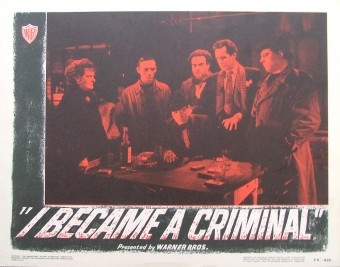
They Made Me a Fugitive is the kind of film that reminds you just how lucky we are to have older movies being dusted off and made widely available once more, and on media that enables virtually anyone to enjoy them; the consistent rediscovery of excellent films like this one -- which even many of those of us who love movies deeply (and have a particular weakness for them in their dark and rich '40s glory) have until now missed out on -- is one the greatest, most exciting things DVD/Blu-ray advances in digital technology has made possible. Director Cavalcanti delivers his tale of a framed man's desperate search for justice and struggle to resist the sweet love he's bound to lose in masterful, dramatically tight and aesthetically brilliant strokes; the film is a tour de force of well-delineated structure, seamlessly up- and down-shifted narrative tempos, and tough, surprisingly violent style, with more than its fair share of the tragically romantic heart that usually beats beneath the noir view of the world as a treacherous place where few real emotions survive and one's heart is best kept locked up tight, safe from the storms of indifference, self-interest, and avarice. It's shocking that the film has gone so long before a more adequate/prominent release like this one, but much better late than never; They Made Me a Fugitive is a sterling example of how movies can spot and reveal the art in the hardboiled and pulpy. If they haven't already, anyone who enjoys either or both (that includes just about everyone, doesn't it?) should add it immediately to their must-see/must-own list. Highly Recommended.
|
| Popular Reviews |
| Sponsored Links |
|
|
| Sponsored Links |
|
|
| Release List | Reviews | Shop | Newsletter | Forum | DVD Giveaways | Blu-Ray | Advertise |
|
Copyright 2024 DVDTalk.com All Rights Reserved. Legal Info, Privacy Policy, Terms of Use,
Manage Preferences,
Your Privacy Choices | |||||||









